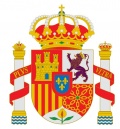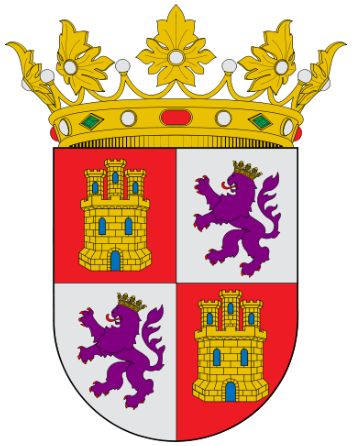Castilla y León: Difference between revisions
Knorrepoes (talk | contribs) m (Text replace - "[[Literature" to "{{media}} [[Literature") |
Knorrepoes (talk | contribs) m (Text replacement - "{|width="100%" style="color:black; background-color:#ffffcc;" |width="15%"|50 px|left |width="70%" align="center" |'''Heraldry of the World<br>Civic heraldry of Spain - Heraldica Española''' |width="15%"|50 px|right |}<seo title="Escudo de armas, Escudos, Armas, Escut" />" to "{{es}}") |
||
| Line 1: | Line 1: | ||
{ | {{es}} | ||
''' CASTILLA Y LEÓN ''' | ''' CASTILLA Y LEÓN ''' | ||
Revision as of 15:19, 4 July 2015
Spanish heraldry portal
This page is part of the Spanish heraldry portal |
Heraldry of the World |
|
Civic heraldry:
|
Other heraldry: |
CASTILLA Y LEÓN
Status : Autonomous Region
Official blazon
Cuartelado en cruz o contracuartelado. El primer y cuarto cuarteles: en campo de gules, un castillo de oro almenado de tres almenas, mamposteado de sable y aclarado de azur. El segundo y tercer cuarteles: en campo de plata, un león rampante de púrpura, linguado, uñado y armado de gules, coronado de oro.
Origin/meaning
The arms are a combination of the arms of the two historical Kingdoms of Catille and Leon. Both used canting arms, the lion for Leon, and the castle for Castille.
The lion design is attributed to Alfonso VII, who became king of Castile and León in 1126. The castle symbol is attributed to his grandson Alfonso VIII. In 1230, Ferdinand III united the two kingdoms and quartered the arms as a symbol of the union. Until the sixteenth century, a full castle, with walls and three towers, rather than the current town design, was used. Th elion, now officially blazoned as purpure, historically was mainly seen as red.
Contact and Support
Partners:
Your logo here ?
Contact us
© since 1995, Heraldry of the World, Ralf Hartemink 
Index of the site
Literature : de Cadenas, A. A. and de Cadenas, V. : Heraldica de las comunidades autonomas y de las capitales de provincia. Hidalguia, Madrid, 1985












